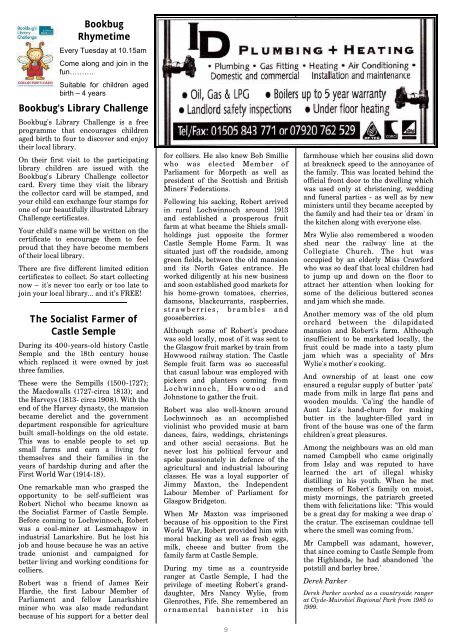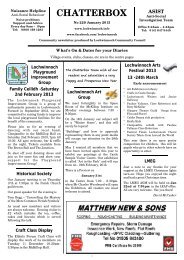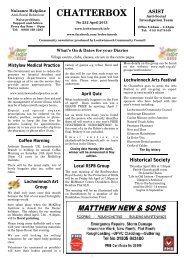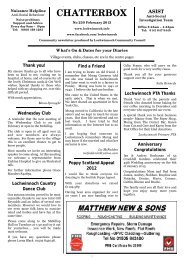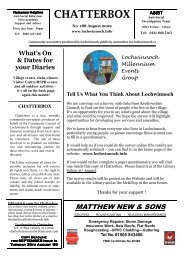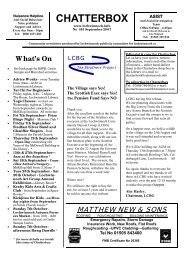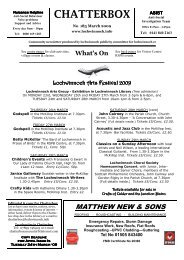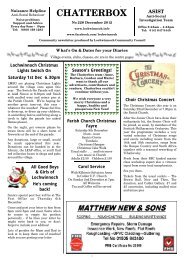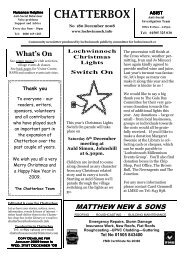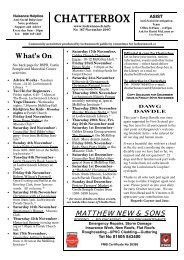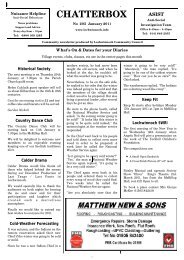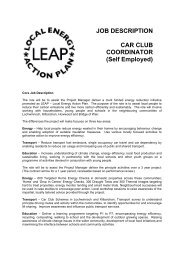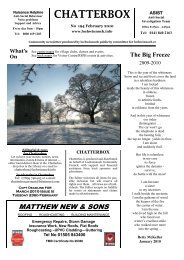CHATTERBOX - Lochwinnoch
CHATTERBOX - Lochwinnoch
CHATTERBOX - Lochwinnoch
You also want an ePaper? Increase the reach of your titles
YUMPU automatically turns print PDFs into web optimized ePapers that Google loves.
Bookbug<br />
Rhymetime<br />
Every Tuesday at 10.15am<br />
Come along and join in the<br />
fun……….<br />
Suitable for children aged<br />
birth – 4 years<br />
Bookbug's Library Challenge<br />
Bookbug's Library Challenge is a free<br />
programme that encourages children<br />
aged birth to four to discover and enjoy<br />
their local library.<br />
On their first visit to the participating<br />
library children are issued with the<br />
Bookbug's Library Challenge collector<br />
card. Every time they visit the library<br />
the collector card will be stamped, and<br />
your child can exchange four stamps for<br />
one of our beautifully illustrated Library<br />
Challenge certificates.<br />
Your child's name will be written on the<br />
certificate to encourage them to feel<br />
proud that they have become members<br />
of their local library.<br />
There are five different limited edition<br />
certificates to collect. So start collecting<br />
now – it's never too early or too late to<br />
join your local library... and it’s FREE!<br />
The Socialist Farmer of<br />
Castle Semple<br />
During its 400-years-old history Castle<br />
Semple and the 18th century house<br />
which replaced it were owned by just<br />
three families.<br />
These were the Sempills (1500-1727);<br />
the Macdowalls (1727-circa 1813); and<br />
the Harveys (1813- circa 1908). With the<br />
end of the Harvey dynasty, the mansion<br />
became derelict and the government<br />
department responsible for agriculture<br />
built small-holdings on the old estate.<br />
This was to enable people to set up<br />
small farms and earn a living for<br />
themselves and their families in the<br />
years of hardship during and after the<br />
First World War (1914-18).<br />
One remarkable man who grasped the<br />
opportunity to be self-sufficient was<br />
Robert Nichol who became known as<br />
the Socialist Farmer of Castle Semple.<br />
Before coming to <strong>Lochwinnoch</strong>, Robert<br />
was a coal-miner at Lesmahagow in<br />
industrial Lanarkshire. But he lost his<br />
job and house because he was an active<br />
trade unionist and campaigned for<br />
better living and working conditions for<br />
colliers.<br />
Robert was a friend of James Keir<br />
Hardie, the first Labour Member of<br />
Parliament and fellow Lanarkshire<br />
miner who was also made redundant<br />
because of his support for a better deal<br />
for colliers. He also knew Bob Smillie<br />
who was elected Member of<br />
Parliament for Morpeth as well as<br />
president of the Scottish and British<br />
Miners' Federations.<br />
Following his sacking, Robert arrived<br />
in rural <strong>Lochwinnoch</strong> around 1913<br />
and established a prosperous fruit<br />
farm at what became the Shiels smallholdings<br />
just opposite the former<br />
Castle Semple Home Farm. It was<br />
situated just off the roadside, among<br />
green fields, between the old mansion<br />
and its North Gates entrance. He<br />
worked diligently at his new business<br />
and soon established good markets for<br />
his home-grown tomatoes, cherries,<br />
damsons, blackcurrants, raspberries,<br />
strawberries, brambles and<br />
gooseberries.<br />
Although some of Robert's produce<br />
was sold locally, most of it was sent to<br />
the Glasgow fruit market by train from<br />
Howwood railway station. The Castle<br />
Semple fruit farm was so successful<br />
that casual labour was employed with<br />
pickers and planters coming from<br />
<strong>Lochwinnoch</strong>, Howwood and<br />
Johnstone to gather the fruit.<br />
Robert was also well-known around<br />
<strong>Lochwinnoch</strong> as an accomplished<br />
violinist who provided music at barn<br />
dances, fairs, weddings, christenings<br />
and other social occasions. But he<br />
never lost his political fervour and<br />
spoke passionately in defence of the<br />
agricultural and industrial labouring<br />
classes. He was a loyal supporter of<br />
Jimmy Maxton, the Independent<br />
Labour Member of Parliament for<br />
Glasgow Bridgeton.<br />
When Mr Maxton was imprisoned<br />
because of his opposition to the First<br />
World War, Robert provided him with<br />
moral backing as well as fresh eggs,<br />
milk, cheese and butter from the<br />
family farm at Castle Semple.<br />
During my time as a countryside<br />
ranger at Castle Semple, I had the<br />
privilege of meeting Robert's granddaughter,<br />
Mrs Nancy Wylie, from<br />
Glenrothes, Fife. She remembered an<br />
ornamental bannister in his<br />
9<br />
farmhouse which her cousins slid down<br />
at breakneck speed to the annoyance of<br />
the family. This was located behind the<br />
official front door to the dwelling which<br />
was used only at christening, wedding<br />
and funeral parties - as well as by new<br />
ministers until they became accepted by<br />
the family and had their tea or 'dram' in<br />
the kitchen along with everyone else.<br />
Mrs Wylie also remembered a wooden<br />
shed near the railway line at the<br />
Collegiate Church. The hut was<br />
occupied by an elderly Miss Crawford<br />
who was so deaf that local children had<br />
to jump up and down on the floor to<br />
attract her attention when looking for<br />
some of the delicious buttered scones<br />
and jam which she made.<br />
Another memory was of the old plum<br />
orchard between the dilapidated<br />
mansion and Robert's farm. Although<br />
insufficient to be marketed locally, the<br />
fruit could be made into a tasty plum<br />
jam which was a speciality of Mrs<br />
Wylie's mother's cooking.<br />
And ownership of at least one cow<br />
ensured a regular supply of butter 'pats'<br />
made from milk in large flat pans and<br />
wooden moulds. 'Ca'ing' the handle of<br />
Aunt Liz's hand-churn for making<br />
butter in the laughter-filled yard in<br />
front of the house was one of the farm<br />
children's great pleasures.<br />
Among the neighbours was an old man<br />
named Campbell who came originally<br />
from Islay and was reputed to have<br />
learned the art of illegal whisky<br />
distilling in his youth. When he met<br />
members of Robert's family on moist,<br />
misty mornings, the patriarch greeted<br />
them with felicitations like: "This would<br />
be a great day for making a wee drap o'<br />
the cratur. The exciseman couldnae tell<br />
where the smell was coming from.'<br />
Mr Campbell was adamant, however,<br />
that since coming to Castle Semple from<br />
the Highlands, he had abandoned 'the<br />
potstill and barley bree.'<br />
Derek Parker<br />
Derek Parker worked as a countryside ranger<br />
at Clyde-Muirshiel Regional Park from 1985 to<br />
1999.


